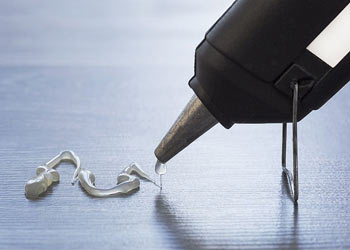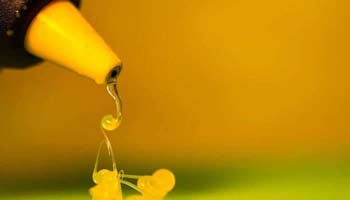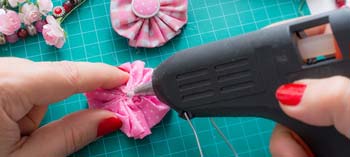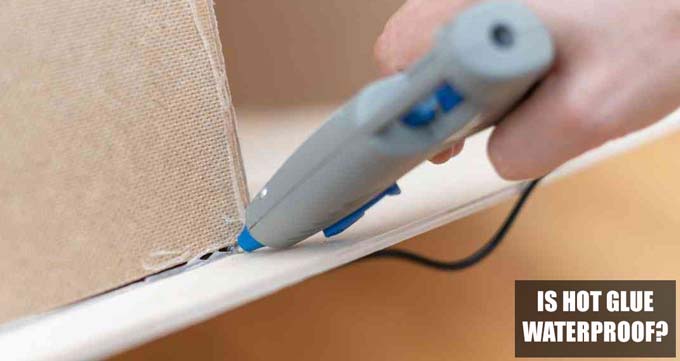Is Hot Glue Waterproof? Everything You Need to Know
Be it small gluing tasks, or an art and craft project, we have been using hot glue guns since forever. Hot glue guns are a staple in most school supplies and have become a part of our lives.
Almost all households have at least one hot glue gun nowadays. After all, it is quite a handy tool!
Although we know that hot glue can attach stuff very quickly, the question " is hot glue waterproof" arises quite often in our minds.
Today, we will get to know whether or not this glue can withstand water damage. So without any further delay, let's get into the details of this very interesting topic!
Table of Contents
What Is Hot Glue?

Hot glue is also sometimes referred to as hot melt adhesive. This is a glue that is sold in a solid form.
You will see sticks of hot glue in various arts and crafts, or even general stores being sold for.
You first have to purchase a hot glue gun. Then, these sticks of hot glue adhesive are bought and used inside the guns.
The gun melts the cylinder of glue and makes it sticky. The glue becomes very hot and tacky. You then apply the glue to the desired location with the help of the glue gun nozzle.
What Is Hot Glue Made Of?
Hot glue is made out of amorphous polymer. This is a sort of plastic.
As we know, plastic is a solid material. That is why, when a glue stick is in its natural state, at room temperature, it is also solid.
What Is Hot Glue Used For?

Hot glue is used for a lot of different tasks. Children use glue for arts and crafts, and a lot of industries use it on leather, and even in some car parts.
Schools use hot glue for projects related to foam or paper. Fabric is also used at times. It’s a very common type of adhesive used for temporary solutions.
Hot glue is sometimes used in the transportation and electronic sector to join small joints together. These joints are rarely exposed to water or heat. Sometimes in the transportation sector, hot glue is also used to connect mount trim, and to assemble small components.
The shoe-making industry also uses hot glue to attach insoles and the foam inside shoes.
Besides that, hot glue is also used to bind books. Because books are rarely exposed to water or heat, hot glue can be used to bind paper very easily.
How Does Hot Glue Work?
You put the cylinder of hot glue inside the glue gun. Then, the gun melts this glue with a suitable amount of heat.
This heat has to be regulated to perfection. If the gun becomes too hot, then, the glue will be too liquid and messy. But, if the gun is not hot enough, the cylinder of glue will not melt evenly.
So, after applying the perfect amount of heat, the glue is melted and squirted out through the nozzle.
The glue comes out in a manageable and tacky consistency. After application, the glue goes back to its previous solid state once cooled.
To summarize, hot glue will expand and melt when exposed to heat. Then, when it cools down, it returns to its solid state. This thermoplasticity property Is what gives it its adhesive quality.
Is Hot Glue Permeable?
The thing about plastic is that it contains long chains that are made of a fundamental polymeric unit. This unit is repeated ‘n’ number of times in the chain.
The structure formed in the polymer construction is a compilation of twists that make it impossible for water molecules to pass through.
That is why plastic is waterproof. Meaning, water cannot pass through the surface of the plastic.
Because hot glue is made with similar construction, water will never be able to pass through the glue's structure. Hot glue, no matter what kind it is, is therefore always impermeable.
Is Hot Glue Waterproof?
As we know now, hot glue has the property of thermoplasticity. This is how the glue goes back to its previous solid state.
While this helps the glue to attach to surfaces together, this is also what causes trouble in the waterproof department.
When you expose hot glue to water, it decreases the material's temperature significantly. This is how the glue goes back to its solid state.
But, when an already solid glue is exposed to more water, the temperature decreases even further.
Therefore, the glue contracts and seizures more. It can at times become smaller, therefore releasing itself from the materials it had attached itself to. Water exposure can also create holes or cracks on the surface of the solid glue.
With long exposure to water, the glue will give in and come off.
There are some glues that have been carefully articulated to tackle this issue. Plasticizing chemicals are often added to the plastic in hot glue. But still, it cannot make the glue 100% waterproof.
Hot Glue And Its Effectiveness On Different Materials Due To Water Resistance

We often use hot glue for different types of projects. But, how well can it attach stuff to different kinds of material? Let's find out how effective hot glue is on some common materials.
1. Hot Glue And Wood
Wood is a porous solid. This means that when exposed to water, wood will absorb the liquid.
Oftentimes, a waterproof sealant is applied to the surface of the wood when it is used in furniture or different types of projects.
Therefore, it is recommended that you don't use hot glue on any wooden projects. Because, it requires a lot of additional steps, and can be very hard to perfect.
The water can very easily seep through the wood, and attack the surface of the hot glue.
2. Hot Glue And Glass
Now, glass is not a porous material. But it is an amorphous solid. This means that the material exhibits thermal contraction and expansion. But, this is in a very regulated range. Glass can hold on to it or even cold temperatures for quite a long time. It is not a good conductor of heat.
But, you can see that hot glue works better on glass than on wood. You can proceed with using hot glue on the glass if you are confident that the glass will not be exposed to frequent changes in temperature.
You should never use hot glue on glass projects if the glass item is going to be exposed to water.
3. Hot Glue And Plastic
You can use hot glue to add stuff onto plastic surfaces. It works well.
Plastic does not let water seep through, and can therefore keep the hot glue intact. But, you should not use hot glue on projects that might be exposed to water.
4. Hot Glue And Metal
Metal is a very good conductor of heat. Therefore, if the metal gets hot, the glue attached to metal surface will melt almost immediately.
Also, if the metal is exposed to a cold temperature, the glue will seize up and crack very easily.
But, some hot glues are made for use on metal surfaces. Even then, you cannot rely on them completely. Even the tiniest amount of stress can detach the hot glue from a metal surface. Also, it has been seen that hot glue detaches itself from metal surfaces in any case with time.
5. Hot Glue And Fabric
We see a lot of projects that show us how to hot glue buttons, or small decorations onto fabric. This is recommended because hot glue can stick to the surface of the fabric quickly.
The woven texture of the fabric allows the hot glue to melt in easily. But, the fact that fabric is permeable has to be considered.
Water Can easily pass through the fabric. And therefore, water can also easily get access to the dried hot glue. So, although hot glue can give you a temporary fix, it cannot be a permanent solution on fabric.
Can Hot Glue Be Used For Outdoor Projects?
As we have mentioned before, hot glue is mainly made out of plastic. And we know that plastic and UV exposure don't work together.
You can use hot glue for outdoor projects if you are in a hurry. But, you should know that the hot glue won't be able to hold your project together for long.
Firstly, the hot glue will be exposed to UV light. This will cause a change in its temperature. Therefore, the glue will probably melt very easily. This factor is a higher risk if the project is placed under direct sunlight.
Besides that, outdoor projects need to have weather protection. The hot glue will probably be exposed to rain and even snow.
When it snows, the temperature will be very low, and the hot glue will probably seize up. Because of the contraction, you will see cracks and holes in the glue, and the glue will slowly let go. And when it rains, the water will surely demolish the hot glue adhesive capability.
So, it is not recommended to use hot glue on outdoor projects. But, if this is a project that will only be used outdoors rarely, you can sometimes use hot glue. Even then, you shouldn't have much hope for its capability.
Frequently Asked Questions
1. How Long Does Hot Glue Take To Dry?
Hot glue will solidify within a few minutes of application. But you should let it cure and harden for 24 hours before handling it.
2. What Material Should You Never Put Hot Glue On?
Any surface that is greasy or oily will not work well with hot glues. Therefore. You should not use hot glue on vinyl, parchment paper, or some specific types of metal.
3. Is Hot Glue Better Than Super Glue?
Hot glue and super glue are used for completely different projects. But still, when compared, super glue is much stronger and more durable than hot glue.
4. Can You Cut Hot Glue Sticks?
Yes, you can. Some shops sell extremely long sticks of hot glue that you can then cut and use according to your needs.
5. What Can Dissolve Hot Glue?
Rubbing alcohol, or acetone can sometimes dissolve hot glue. People use this to remove excess hot glue from their projects.
Final Words
We use hot glue almost regularly in our lives. But is hot glue waterproof?
In short, no. While it does not let water pass through its surface, it is not protected from water damage. Exposure to water will surely destroy its adhesive capabilities!
So, be careful what you use this glue for!

